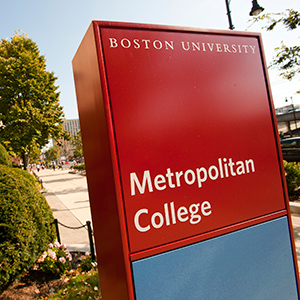Metropolitan College’s online master’s program in criminal justice is the best in the country in the latest U.S. News & World Report rankings of online academic programs. It has moved up one spot from last year.
MET’s computer information systems graduate program placed third in the rankings, the same spot it held last year, while the college’s management programs went from ninth in 2015 to sixth in the list of best online graduate business programs.
The magazine’s latest ratings compared 55 universities and colleges for criminal justice, 48 for computer IT, and 130 for management.
The rankings “are another testament to the quality of Metropolitan College’s online programs,” says Tanya Zlateva, dean of MET. “We are lucky to have a dedicated team of teachers, researchers, designers, student support coordinators, engineers, and administrators.”
All MET online programs have been ranked in the top 10 in their respective categories for three years running, she says. “We continually innovate the curriculum, increase interactivity, and improve services,” mixing live classroom meetings and project presentations with online labs and study groups.
All online courses even provide maps showing the geographic location of their students, to help them get in touch, Zlateva says.
The magazine’s methodology for ranking programs includes faculty credentials and training, programs’ selectivity in admitting students, peer reputation, and the services and technology made available to students.
BU has long been recognized for its online learning. The University created its first online course in 2001, and in 2013 joined the online educational consortium edX to develop massive open online courses (MOOCs) and hybrid classes involving both online and traditional instruction. Last year, MET’s online master’s programs for military veterans tied for second place in the U.S. News rankings.
“Education that is accessible, affordable, academically rigorous, and leads to jobs and fulfilling careers is a requisite for a sound economy and professional success,” Zlateva says. “Online education meets these needs.” More than that, “it brings the virtual world into the millennial tradition of teaching and learning. We see a young technology that provides a sensor-rich environment and connects people thousands of miles apart in service of learning.”
She quotes Socrates to show how the great philosopher might have appreciated online teaching’s novel approach to learning, whose goal is the “intelligent word graven in the soul of the learner, which can defend itself, and knows when to speak and when to be silent.”
















































Hooray!! I’m not surprised. The Master of Criminal Justice online program I completed in May, 2014 was difficult, strenuous, informative, exciting and inspirational. In fact, I miss it. I so enjoyed the classes, the reading, the professors, the facilitators and my fellow students. I even enjoyed the quizzes, the papers and the exams. Okay, don’t get hysterical. They all played a role in the total picture. Thank you, BU, and keep up the good work…